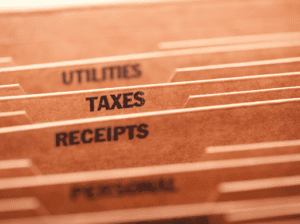Best Business Bookkeeping Practices for Keeping Tax Documents
Whether you’re just starting to launch a small business or have been at it for years, bookkeeping is an essential component. But for many, numbers and finances are daunting, and relying solely on software could leave gaps where you’ll want to know what’s entirely there. This past year, questions about taxes have been on the rise. There’s been a 140% increase in Google searches for business tax preparation and a 50% increase in small business bookkeeping . As a result, businesses are looking for answers to bookkeeping questions.
So we’re delving into the top questions about bookkeeping for getting your tax documents in order this year.
Are Bookkeeping and Accounting the Same Thing?
Not exactly, but they do work with one another. Bookkeeping records and tracks business financials for all transactions, operations, and other events relating to the business. Accounting is the measurement, processing, and communications about bookkeeping. Think of it this way – Bookkeeping looks back on the business specifics and accounting looks forward to projecting trends and other financials from bookkeeping records.
Why is Bookkeeping Important for a Small Business?
It’s well-known that bookkeeping is essential if your business gets audited. But keeping up with your books can also help with analyzing and planning for the months and years ahead, streamlining and minimizing accounting costs, and saving countless hours during tax season. You’ll be able to get a snapshot of how your business is performing overall but also get to deep dive into specific analytics of sales, costs, and much more.
What Are the Most Common Business Records?
Some business records will be needed often and should be kept on hand for easy access. Whether it’s journals, ledgers, or digital recordkeeping, you’ll want to find an organization method that works best for your business. Generally, it’s best to track transactions daily for easier long-term recordkeeping.
- Employee names, addresses, and contact information
- Employee timesheets
- Employee pay stubs
- All tax forms submitted to the IRS
- Bank statements
- Insurance documents
- Contracts, including loans and mortgages
- Purchase receipts
- Customer invoices
- Tax returns
- Financial statements
- Depreciation schedules
- Business registration documents
- Employer Identification Number
- Board of Directors meeting minutes
- Legal files
- Emails

Whether it’s journals, ledgers, or digital recordkeeping, you’ll want to find an organization method that works best for your business.
How Long Should I Keep Records?
The length of time for keeping records varies but the general rule of thumb is to keep records for a minimum of seven years for IRS reporting. Of course, your insurance or creditors may require you to keep records for longer. You can see a full breakdown of the recordkeeping timelines in this IRS article .
How Do I Pull Payroll?
Depending on how you’re keeping bookkeeping records, the method may look a bit different. But generally, you’ll want to go to your reports menu, find the payroll section, and go to payroll summary. While there, you’ll want to narrow your date range and employee search. Lastly, you’ll want to run the report.
How Can I Improve My Tax Position to Reduce My Payout?
The quickest and most reliable way to improve your tax position is to work with top-quality compliance and specialized accountancy services, like Stenson Tamaddon .
Contact us to learn how we help small businesses like yours with Employee Retention Credits, Research & Development tax credits, and Work Opportunity tax credits.
See firsthand how the Providertech portal works. View a live demo during the webinar, get your questions answered, and test it out for yourself. Get your unique code to demo the portal following the webinar.
The post Best Business Bookkeeping Practices for Keeping Tax Documents first appeared on Stentam.
The post Best Business Bookkeeping Practices for Keeping Tax Documents appeared first on Stentam.




Lead Types
ERC Exclusive Leads
ERC Inbound Calls
ERC Small Business Data
Our Company
Let’s Connect
Youtube
Contact Us
GetErcLeads.com is Powered By GROW with MKG


